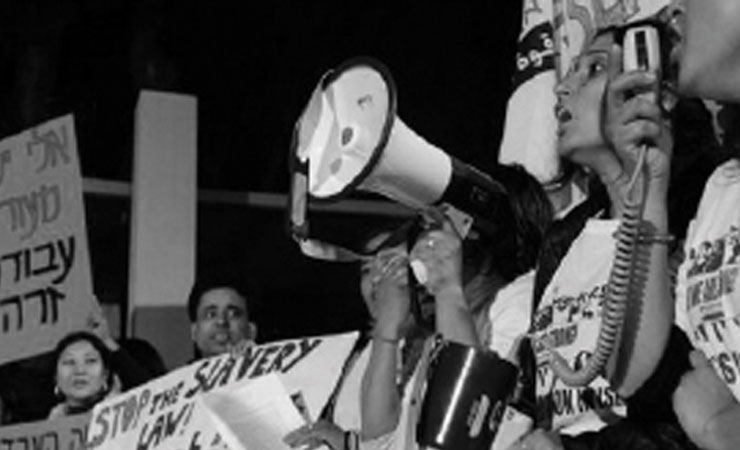National Insurance Institute encumbers medical treatment to workers who are not Israelis and forces Kav LaOved to file unnecessary lawsuits to Labor Court.
By Hanna Zohar
Last week, an investigation was aired on the show “The Net” on Channel 2, which dealt with the iniquity of the National Insurance Institute and the abuse of citizens in need of its services. By presenting a number of cases, the program showed how the institution (which we are supposed to trust and lean on in times of trouble) abused, humiliated, and ignored citizens with absolute inflexibility, bullying the very people who fund the NII’s activities through their monthly salaries.
The people interviewed in the investigation were those abandoned by the NII in their darkest hour; their story is difficult, undoubtedly. However, imagine what happens for non-Israeli workers employed in Israel (refugees and asylum seekers, foreigners and Palestinians), when they are in need of the services of the institution, in days of pain and deficit. Just like Israeli workers, these workers also pay monthly social security contributions, and therefore are eligible for medical treatment following a work accident, medical rehabilitation, compensation for lost days and disability benefits. When working women give birth, they too are entitled to compensation for the cost of hospitalization, a maternity grant and payment of maternity leave.
The NII makes the process of acquiring medical treatment after a work accident incredibly burdensome and even cruel, when the case deals with workers who are not Israelis. One of the ways in which this occurs are the use of twisted contracts and agreements by healthcare providers, even though the treatments should be provided in a similar way they are given to Israelis – as part of the insurance workers’ pay each month. These contracts cause a situation in which HMOs condition the provision of prepaid medical care, contrary to the spirit of the law which makes certain that every worker injured on the job receives medical treatments.
This week we filed two lawsuits to the Labor Court against the NII, both which were ridiculously unnecessary. Stephane Twalda, employed in construction, was injured at work when an iron beam fell on him in August 2013. After he turned to us for help, we assisted him in filing a request for compensation for the twenty-six days in which he was prevented from working due to his injury. The payment was delayed, it seems, since the NII and the HMO could not find the code computerized given to his case, and instead of referring to the confirmation of the injury that Twalda holds (indicating the approval of the twenty-six days absence), they would rather go back and forth many times between the various parties, and delay the payment.
We turned to the NII several times and asked them to find the code or use the confirmation, but only after we engaged with the advisor of the CEO were we told that the money would be transferred to Twalda’s bank account. Months passed, a year and a half since the accident, and the worker still didn’t receive the money.
We didn’t give up and sent a letter to the legal advisor of NII. We received an answer that the money was transferred to the worker’s account at the postal bank. We checked with the worker if he had an account there, he said no, and we quickly passed this information to the NII, who did not bother to check the existence of such an account before the alleged money transfer. After several months and still no response, we had no choice but to turn to the Labour Court.
Malam, an Ethiopian asylum seeker, gave birth last year. She worked for over a year cleaning a gym through a contractor who paid her wages in cash. She did not receive pay slips. We filed a lawsuit on behalf of Malam to the NII and indicated where she worked and that the contractor refused to give her pay slips, as required by law. At the same time we demanded the actual employer, the gym, and the contractor to pay compensation. In their defense, the gym denied being Malam’s work place.
Just like before, here too we had to involve the advisor of the CEO and we received an answer from him on the phone and in writing, that while an investigation was being conducted on the subject, the contractor refuses to cooperate. It should be noted that under the law, if employer-employee relations are proven, the NII must pay the worker his rights, and afterwards may sue the employer themselves.
The Maternity Department of NII decided to reject the claim of Malam. We received written notice and now, to our understanding, all we have left to do is to appeal further and file an unnecessary lawsuit to the Labor Court.
Translated by Angie Hsu


